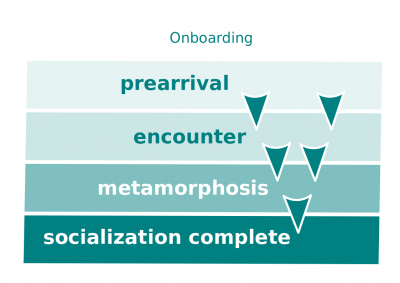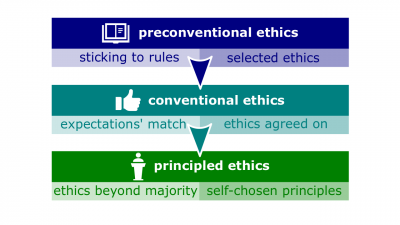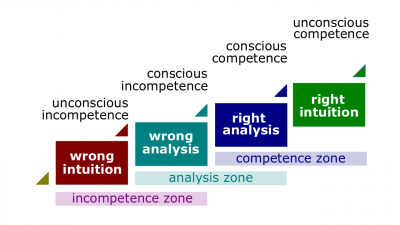Difference between revisions of "Learning sequence"
(→Jablin's concept) |
(→Group development) |
||
| Line 4: | Line 4: | ||
==Process-based Sequences== | ==Process-based Sequences== | ||
===Apprentice learning=== | ===Apprentice learning=== | ||
| − | |||
| − | |||
| − | |||
| − | |||
| − | |||
| − | |||
| − | |||
| − | |||
===Jablin's concept=== | ===Jablin's concept=== | ||
Revision as of 17:48, 20 December 2019
A learning sequence (hereinafter, the Sequence) is any sequence of learning stages or educational objectives that any human-learning theory suggests.
Contents
Process-based Sequences
Apprentice learning
Jablin's concept
- Onboarding is the process and/or the Model that depicts that process of either (a) integrating a new employee into an organization including helping this employee to adapt to the organization's culture (this process is more specifically known as organizational socialization, socialization process, or, simply, socialization), or (b) familiarizing a new customer or client with one's products or services.
- Prearrival stage. The period of learning in the socialization process that occurs before a new employee joins the organization.
- Encounter stage. The stage in the socialization process in which a new employee sees what the organization is really like and confronts the possibility that expectations and reality may diverge.
- Metamorphosis stage. The stage in the socialization process in which a new employee changes and adjusts to the job, work group, and organization.
Kohlberg's theory
- Kohlberg's theory. The theory of stages of moral development that is developed by Lawrence Kohlberg based on Piaget's theory.
- Preconventional level. The lower level of the Model in which a person's choice between right and wrong is based on personal consequences from outside forces or, in other words, is extrinsically motivated. This level consists of two stages: (a) sticking to rules to avoid punishment and (b) following the rules only when doing so is in the person's interest.
- Conventional level. The middle level of Model in which a person's choice between right and wrong relies on maintaining expected standards and living up to the expectations of others, or, in other words, is cooperatively motivated. This level consists of two stages: (a) living up to what the people close to the person expect and (b) maintaining conventional order by fulfilling obligations to which the person agrees.
- Principled level. The upper level of Model in which a person's choice between right and wrong is based on the person's own moral values apart from authority of the groups to which he or she belongs or society in general, or, in other words, is intrinsically motivated. This level consists of two stages: (a) valuing rights of others and upholding absolute values and rights regardless of the majority's opinion and (b) following self-chosen ethical principles even if they violate the law.
Piaget's theory
- Piaget's theory emphasizes cognitive development. Although it is considered being outdated, this theory influenced a number of other studies and extensions such as Kohlberg's theory.
Objective-based Sequences
- Main wikipage: Educational objective
Bloom's taxonomy
- Main wikipage: Bloom's taxonomy
KSA
- Main wikipage: KSA
Structured-task competence
- Main wikipage: Structured-task competence
- Structured-task competence is one's competence in performing some structured task, as well as a hierarchy of various levels of the Competence and the Sequence that suggests how this hierarchy can be developed.
- Unconscious incompetence (or wrong intuition). A situation in which the individual neither understands nor knows how to accomplish a task and does not necessarily recognize the deficit.
- Conscious incompetence (or wrong analysis). A situation in which the individual neither understands or knows how to accomplish a task, but he or she recognizes the deficit. He or she also realizes the value of new knowledge, skill, and/or ability needed in addressing the deficit. The making of mistakes can be integral to the learning process at this level of competence.
- Conscious competence (or right analysis). A situation in which the individual understands and/or knows how to accomplish a task. However, demonstrating the knowledge, skill, and/or ability requires concentration. It may be broken down into steps, and there is heavy conscious involvement in executing the needed knowledge, skill, and/or ability.
- Unconscious competence (or right intuition). A situation in which the individual not only understands and knows how to accomplish a task, but has had so much practice with a skill that it has become "second nature" and can be performed easily. As a result, the skill can sometimes be performed while executing another task. The individual may be able to teach it to others, depending upon how and when it was learned.
Zone of proximal development
See also
- https://www.simplypsychology.org/vygotsky.html
- https://yandex.ru/images/search?text=learning%20piaget&stype=image&lr=87&source=wiz&pos=2&img_url=https%3A%2F%2Fpryncepality.com%2Fwp-content%2Fuploads%2F2019%2F05%2Fpiaget-cognitive-development-chart-fresh-myers-psychology-7th-ed-ppt-of-piaget-cognitive-development-chart.jpg&rpt=simage
- http://www2.education.uiowa.edu/html/eportfolio/tep/07p075folder/Piaget_Vygotsky.htm
- https://www.funderstanding.com/educators/piaget/
- https://www.verywellmind.com/piagets-stages-of-cognitive-development-2795457
- https://www.simplypsychology.org/piaget.html
- https://exploringyourmind.com/piaget-and-his-theory-about-learning/
- https://www.academypublication.com/issues/past/jltr/vol02/04/01.pdf
- https://yandex.ru/images/search?text=learning%20model&stype=image&lr=87&source=wiz
- https://en.wikipedia.org/wiki/Action_model_learning
- https://www.teachthought.com/learning/learning-models-learning-theories-index/


